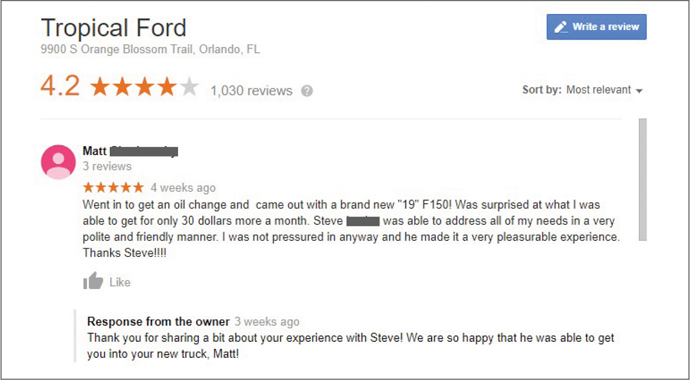The Wow Factor You Didn’t Know Was Missing

Article Highlights:
- How customers benefit from predictive data.
- Turning oil changes into new car sales.
You hear a lot about predictive data and how it can help businesses turn higher profits and capture more customers. But what isn’t talked about as much is the customer’s perspective – how predictive data affects their experience.
Have you ever been blown away by someone’s hospitality? The Ritz-Carlton is a great example as they pride themselves on providing an over-the-top experience for every customer. A story recently circulated about some guests who had a son with food allergies. The family had traveled with specialized eggs and milk, but upon arrival, they realized the eggs broke during the trip, and the milk had spoilt. The Ritz-Carlton staff set out to find the specialized foods for the family, but given they were in Bali, finding just the right eggs and milk proved to be a challenge. After searching all over town, the chef had no choice but to call a family member 1,000 miles away to ask if she would fly down to Bali with the ingredients. Sure enough, they made it happen and accommodated specifically to the guests’ needs. This is a defining moment. This is a wow factor. Experiences like this are what turn occasional customers into lifelong buyers.
In your dealership, think of this as everyday customers coming into your service drive for a typical oil change. They are expecting a routine visit, but after a thorough inspection, their vehicle is in need of $1,000 in repairs. Instead of spending the money to repair their vehicle, they could trade it in for something newer and nicer – something they didn’t consider an option before. What a lasting impression that leaves with the customer! People are most satisfied when they least expect it and when it feels like you’re going above and beyond for them. This is definitely apparent when customers arrive in service but leave F&I instead.
Some customers go so far as to share online how satisfied they were with the service they received. Take a look at this example:

Not only was he happy with the outcome of his visit, but he praised the dealership staff’s service along the way – pleasurable, polite, friendly, no pressure. What dealership wouldn’t want to add these qualities to their resume? Customer reviews like this are what online brands are built on. And despite all the technology in the world, word of mouth referrals are still gold.
At the end of the day, do customers notice you’re using data to fine-tune and personalize their experience? Not necessarily, but they do take note of how they’re feeling and their overall satisfaction. Ultimately, providing this Ritz-Carlton level of service means new lifelong customers, a better reputation, and turning that missing wow factor into an integral part of your store.
Related Articles:

Leading The Way: 3 Tips to Help Your Team Find Quality Prospects
Customers have unlimited options in today’s market, so it’s important your team makes the most of every interaction. Failure to do so jeopardizes long-term customer…

Three Things Baseball Can Remind Us About Funding a Deal
As we head into summer, there are many things to look forward to, like children laughing in the park and ice cream trucks spreading familiar…

Understanding the FTC’s Enforcement Tools and How You Can Create Your…
The Federal Trade Commission (FTC) has intensified its focus on dealerships and is attempting to add new regulatory practices to their already robust arsenal. If…

Is your sales team staying in tune?
Everybody enjoys a good musical performance. The singer producing an amazing melody on the microphone and the band backing them up with their instruments. The…















